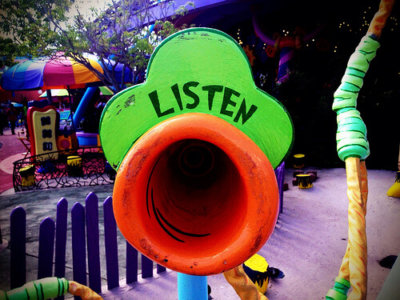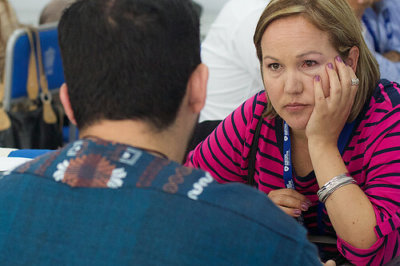Advanced Listening Skills (That Most People Don’t Know But Therapists Do!)

By: Britt Reints
by Andrea M. Darcy
Why are therapists so good at making you feel heard? They have listening skills most people have no clue about.
Read on for what advanced listening skills really consist of, and soon you will connect better with others and avoid unnecessary conflict in relationships by listening properly in the first place.
How to be a Good Listener in 10 Steps
So how can you listen like a therapist?
1. Listen with more than your ears.
Sure, it’s our ears that do the listening.
But our bodies reflect how much we are listening. If you are fidgeting, or looking around, not only are you probably not fully taking in what the other person is saying, you are giving them the signal you don’t care.
Put positive body language back into your listening equation. Sit still. Relax your shoulders and body, uncross your legs and arms (crossed limbs show defensiveness) and be present.
It can help to lean in a little, if it feels comfortable. This gives the other person the signal you really care what they are saying.
Then take a cue from therapists and use affirmative cues – most of us do these naturally when we are properly focused on a conversation. They are things like nodding your head slightly, making understanding facial expressions, and saying, ‘mmm’, ‘yes’, ‘go on’.
2. Make your mind focus and be present.

By: Alan Levine
Many of us arrange our face so we look like we are listening when in our mind we plan our evening dinner or our work presentation. This is not really listening at all.
Repeat what they are saying in your mind as they speak, so you are fully present and processing. If you find this hard, you might want to try learning mindfulness, a practise that with time can see you naturally more aware of what is going on here and now.
3. Do not plan what to say next.
Listening only enough to formulate a connected story about yourself in your head you can share as soon as they stop talking isn’t actually listening, it’s competing or attention seeking.
To be a good listener you have to take yourself out of the equation. Again, just be present to what they are saying.
4. Drop the assumptions.
Don’t assume you know what they are going to say next, where they are going with the story, or what they mean. If you have to assume anything, make the assumption that not everyone sees things as you do, and focus on hearing their perspective with the following steps.
5. Reflect back.
When they have paused or finished, paraphrase and repeat back what they just said.
For example, if they have just finished telling you that they can’t go away for the weekend now because their partner now has to go in to work, you could reflect back, “so he can’t get the weekend of work and you are upset to not be going away?”
This has two amazing results – the other person feels completely heard, and you avoid confusion. If you have misunderstood, it can be cleared up on the spot.
For example, you might have assumed that your friend is upset to not go away, but she might respond with, “no, we’re glad, he’s being paid extra to go in and we honestly have so much going on it’s better to go another time”.
6. Ask good questions.
A good listener is also good at asking questions that allow the speaker to find answers for themselves.
Good questions rarely begin with ‘why’ -these are a one-way ticket down the rabbit hole of self doubt and uncertainty. Try questions that begin with ‘how’ or ‘what’. So instead of, ‘why do you want to quit your job’, ask, ‘what would you do instead if you quit your job’ and ‘how would you go about quitting?’
For more on this, read our piece on how to ask questions that move you forward.
7. Show empathy, not sympathy.
If you understand what they are talking about, or are genuinely concerned, show them empathy.
But forget about sympathy, which comes across as condescending. For example, “That must be really challenging I can hardly imagine” is much more powerful than “poor you you must feel terrible”.
Not sure of the real difference? Read our piece on sympathy vs empathy.
And if you don’t actually empathise, don’t fake it. It’s dishonest. Just continue to listen.
8. Drop the advice.
If there is one thing that can kill all the good listening you just did, it’s following it up with some advice, which leaves the other person feeling talked down to.
Western society seems to think that sharing an experience is somehow asking for answers, when really it is just asking to be heard. And being heard tends to help people find their own answers.
So ask first. It’s as simple as, ‘did you want my advice on that?’ Then don’t be offended if they say no.
9. If you have something to share, ask first.
As for your matching story that their sharing has inspired, again, it’s often a good idea ask first. “I have an experience like that, if you’d like to hear it. If not, another time.”
It’s not that it should be a one way conversation. It’s just that sometimes, if someone has shared something meaningful, moving on to your story can leave them feeling a bit lost at sea. The next conversation can be about you – and if you’ve listened well, there is more of a chance that you will be properly heard as well.
10. Keep it confidential.
Assume, even if not implicitly stated, that what you are being told is confidential and keep it to yourself.
 Andrea M. Darcy is a mental health and wellbeing expert with training in person-centred counselling and coaching. She thinks listening is one of the best superpowers out there. Find her on Instagram @am_darcy
Andrea M. Darcy is a mental health and wellbeing expert with training in person-centred counselling and coaching. She thinks listening is one of the best superpowers out there. Find her on Instagram @am_darcy





